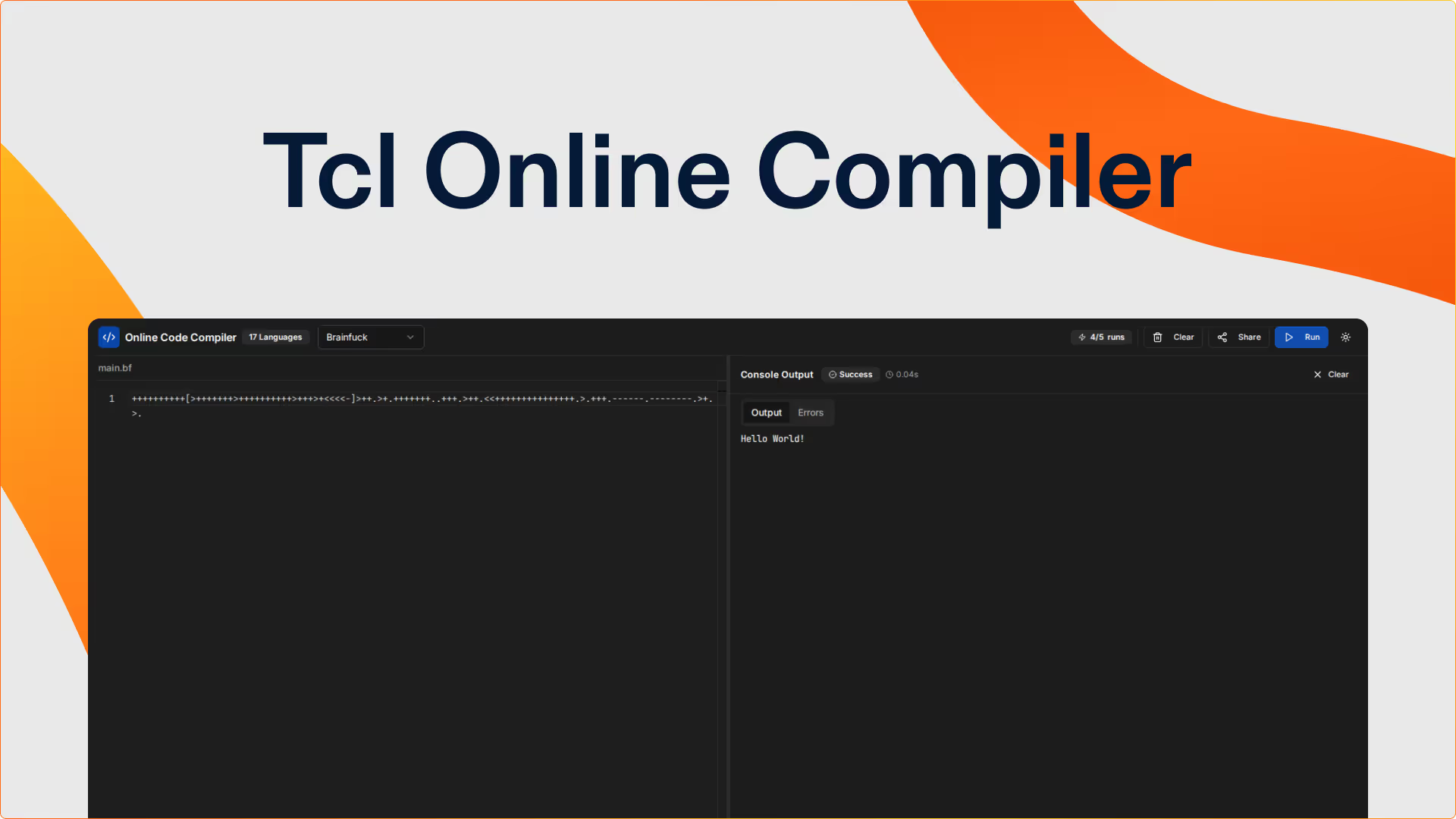


































Online Tcl Compiler Features
Everything-is-a-String Philosophy
- Uniform data representation—numbers, lists, commands all treated as strings internally
- String substitution everywhere—$var expands variables, [cmd] executes commands and substitutes results
- Simple parsing rules—commands and arguments separated by whitespace, quoted with braces or quotes
- Flexible yet powerful—string-based design enables metaprogramming and dynamic command generation
Command Substitution & Composition
- Nested command execution—[expr $a + $b] runs expr command and substitutes the result
- Build commands dynamically—construct command strings and execute with eval
- Variable substitution with $—automatic expansion of variables in command arguments
- Backslash escaping—control special character interpretation for precise string handling
List Processing Power
- Lists are first-class values—create with {item1 item2}, manipulate with lappend, lindex, llength
- Foreach loops for iteration—process list elements naturally: foreach item $list { ... }
- List as strings—Tcl's string nature makes list manipulation intuitive and consistent
- Split and join operations—convert between strings and lists for data processing
Practical Scripting
- Perfect for automation—write scripts for text processing, file manipulation, and task automation
- Configuration language—Tcl's simple syntax makes it excellent for config files and DSLs
- Tk GUI toolkit—learn Tcl as foundation for Tk graphical interface development (Tk not available online)
- Embedded scripting—Tcl is designed to be embedded in larger applications as scripting layer
Tcl Keyboard Shortcuts
Experience the power of Replit AI

This entire Tcl compiler was built by Replit Agent 3 from a natural language prompt. Replit's environment facilitates rapid development, iteration and testing code for users of any technical ability. Develop software faster and better with Replit’s autonomous AI.
Get started freeFrequently Asked Questions
What version of Tcl does this compiler support?
This Tcl compiler runs Tcl 9.0, the latest major version with improved Unicode handling, better performance, and modern language enhancements. Practice Tcl scripting with up-to-date features and capabilities.
What does everything is a string mean in Tcl?
Tcl treats all data—numbers, lists, commands—as strings internally. This uniform representation makes parsing simple and enables powerful metaprogramming. When you write set x 5, the 5 is a string that can be used as a number in expr.
How do I define functions in Tcl?
Use proc command to define procedures: proc square {x} { expr {$x * $x} }. Call like any Tcl command: square 5 returns 25. Procedures can take multiple arguments and return values with return command.
What is the difference between $var and [cmd]?
$var substitutes variable value; [cmd] executes command and substitutes its result. For example: set a 5; set b [expr $a + 3] executes expr, adds 5+3, stores 8 in b. Use [] for command substitution, $ for variables.
Can I use Tcl for automation scripts?
Yes! Tcl excels at text processing, file manipulation, and task automation. While file I/O is limited in browser environments, you can practice Tcl syntax, list processing, string operations, and logic that transfers to local scripting.
Is Tcl still relevant today?
Absolutely! Tcl is used in EDA tools, embedded systems, network testing, and Tk GUI applications. Its simplicity and extensibility make it valuable for domain-specific languages and embedded scripting layers in larger applications.
How do lists work in Tcl?
Lists are strings with special formatting: {item1 item2 item3}. Use lappend to add items, lindex to access elements, llength for length, foreach to iterate. Tcl's string nature makes list manipulation intuitive and consistent.
What is Tcl good for learning?
Tcl teaches scripting fundamentals, string processing, and language design principles. Its simple syntax focuses on concepts over ceremony. Great for understanding command-based languages, substitution mechanisms, and rapid prototyping techniques.
Build, test, and ship faster than ever with Replit
Replit is the only platform that combines a cloud IDE, Agentic Al coding, and seamless team collaboration to help you prototype and ship apps in record time. Build in 50+ languages, work from any device, and deploy in one click — no setup required.

